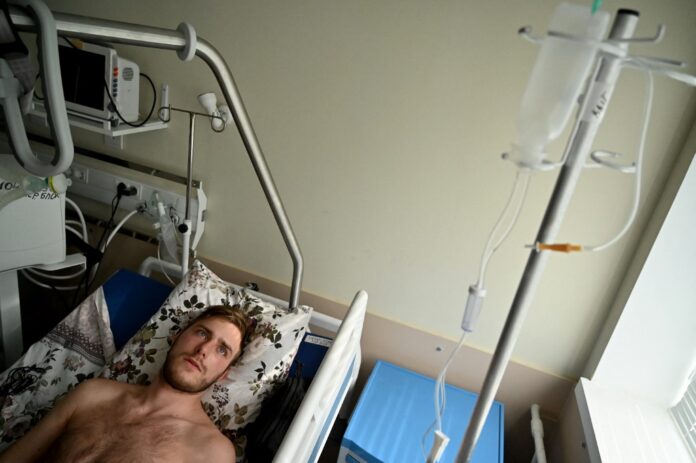An Ukrainian serviceman wounded during the fighting with Russian troops near the Ukrainian capital lays in a bed in a hospital in Kyiv on March 4, 2022. — AFP photo
KYIV (March 5): Leaning over the bloody bed, the Ukrainian doctor examines the body of Private Oleksiy, wounded by the Russians in their advance on Kyiv, where he was taken to hospital Friday.
“Can you feel your leg?” asks the doctor, a bearded man in a blue sleeveless anorak and a brown T-shirt.
“Yes,” Oleksiy replies under his respirator, “but I can no longer feel my leg.”
Oleksiy arrived in the morning from Bucha, about 30 kilometres (20 miles) to the northwest, where Russian forces are pummelling Ukrainian soldiers to break their stubborn defence of Kyiv’s northwestern gate.
The wounded soldier is lying naked under a fine, sky-blue gauze, which the doctor lifts to assess the damage.
His right foot is whole, unlike the left, which is wrapped in a thick, bloody bandage.
The doctor presses the left leg as he moves up along the right, which is covered with a large, black tattoo.
When he reaches the very top, the injured man twists, grunting in pain.
“Relax, relax,” the doctors says.
It is the left leg that most worries the hospital’s director, doctor Oleksandr Shcherbyna.
“He’ll survive,” Shcherbyna says, “but we’ll have to try to save the leg from amputation.”
Tucked away in a green spot in the north of Kyiv, the large hospital block is one of the closest to the Bucha front, which has endured almost incessant shelling for days.
‘Shower of mortar fire’
In another room lie four more shirtless soldiers, also wounded in Bucha.
“We were on reconnaissance and came across an enemy column that had made a breakthrough,” one soldier, 29-year-old Motyka, explains.
“We fought them and killed their soldiers on foot, but they showered us with mortar fire,” he says.
Pounded, the Ukrainian battalion had to retreat, a symbol of the imbalance of forces that favours Russia.
“They were surrounding us,” Motyka says. But still, the shower of mortars did not end.
“Several of our men were killed, including my unit’s commander, who gave us covering fire,” Motyka says.
Motyka was hit by shrapnel on his right side, while his comrade-in-arms, 25-year-old Private Kravchenko, who lies on the next cot, was struck in the shoulder.
Ukraine has so far issued no official military casualty figures, citing just 350 dead civilians.
Moscow claims to have only lost 498 soldiers in nine days of war — far fewer than Ukrainian commanders say they have killed.
Motyka and Kravchenko have blue eyes, athletic bodies and young faces.
They also sport black tattoos — a mix of skulls and ultranationalist symbols — which betray their membership of the controversial Azov Battalion.
‘Neither racists nor Nazis’
The battalion, formed in 2014 from Ukrainian and foreign volunteers who came to fight alongside regular soldiers against Russian-backed separatists in the east, is reputed for its ferocity.
Now officially integrated into Ukraine’s government forces, it has been accused by experts and Western NGOs of serious abuses.
These include arbitrary detentions, summary executions, torture — and they are said to include neo-Nazi fighters in their ranks.
It is a notorious reputation that soldier Kravchenko seeks to reject outright.
“Don’t be afraid of us, don’t demonise us! We’re neither racists nor Nazis,” Kravchenko says,
“The Azov battalion brings together different people from different countries, and we love our Western allies,” he says.
As soon as they are back on their feet, which the soldiers expect to be in just a few weeks, Motyka and Kravchenko vow to return to battle.
“Our morale is at a high,” Motyka says, dismissing the idea of defeat by the Russians.
In the hallway, hospital director Shcherbyna is ready to face a new flood of wounded soldiers.
“With the curfew,” which has been in place since the first days of war, “we have seen far fewer civilian patients. We just have these urgent cases,” Shcherbyna says.
But he swallows hard when faced with the thought of what might come next.
“I don’t know,” the director says sadly, as big booms roll in from Bucha.
On his bed, soldier Oleksiy is still waiting to know if he will keep his leg.
At the entrance to the emergency room, a nurse sits down for a break and begins quietly sobbing. — AFP


